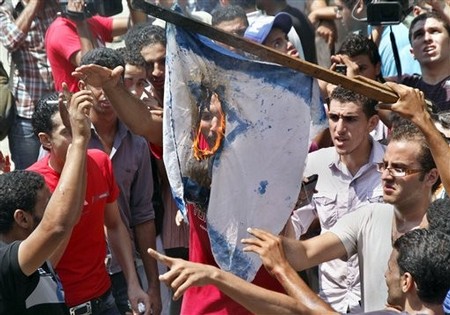Democracy in the Middle East may harm Israel's security.

James Traub defends his enthusiasm for the Arab Spring against the pessimists:
There are, I suppose, two reasons to dump cold water on the Arab Spring. The first is that you think the enthusiasm is overblown, and you enjoying taunting the romantic spirit that sees reflections of America and its democratic values in every popular uprising across the globe. Go ahead and jeer; I would only note that even the grumpy and skeptical John Quincy Adams, who famously abjured crusades to destroy foreign "monsters," added that the American people are "well-wishers" to those everywhere who seek freedom.The second reason is that you believe that while it may be good for them, it's bad for us. But in the long term, that cannot be so. Illegitimate government in the Arab world has been a disaster for the neighborhood, and for the world. Legitimate government provides the only narrative powerful enough to prevail over the appeal of extremism. We have every reason to be well-wishers.
The trouble with this formula is that, from Washington's perspective, the "us" is not simply the United States but Israel as well. After all, a key American interest in the Middle East has been creating a benign security environment for the state of Israel. Reconciling that interest with an interest in the flourishing of Middle East democracy is going to be difficult indeed. Take the recent news from the Egypt-Israeli border:
"Egyptian blood is not cheap and the government will not accept that Egyptian blood gets shed for nothing," state news agency MENA quoted a cabinet statement as saying.The Obama administration is obviously going to work hard to paper over this immediate dispute and wield whatever leverage it has left in Egypt to kept the country at peace with Israel. It's also clear that, at least initially, the goal will be for the U.S. to have its cake (a secure Israel) and eat it too (a democratizing Middle East). But what if those two goals become, at least for a time, mutually exclusive?Egypt's Information Minister Osama Heikal told state TV: "The assurance that Egypt is committed to the peace treaty with Israel ... should be reciprocated by an equivalent commitment and an adjustment of Israeli statements and behavior regarding various issues between both countries."
As crowds of Egyptians protested angrily at the Israeli embassy in Cairo through Saturday night, burning Israeli flags in scenes that would never be allowed during the Mubarak era, both countries were trying to defuse the diplomatic crisis.
But restraint was in short supply among the contenders to become Egypt's future leader in elections due by year-end.
"Israel must realize that the day when Egypt's sons are killed without an appropriate and strong reaction are over," wrote presidential hopeful Amr Moussa -- former secretary-general of the Arab League -- on his website.
Another contender for the leadership, Hamdeen Sabahy, hailed a protester who scrambled atop the Israel embassy in Cairo in the early hours of Saturday to remove and burn the Israeli flag as a "public hero."
(AP Photo)



